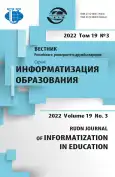Cluster approach to criteria evaluation of the quality of a student’s educational outcome
- Autores: Pak N.I.1, Klunnikova M.M.2
-
Afiliações:
- Krasnoyarsk State Pedagogical University named after V.P. Astafyev
- Siberian Federal University
- Edição: Volume 19, Nº 3 (2022)
- Páginas: 196-207
- Seção: EVOLUTION OF TEACHING AND LEARNING THROUGH TECHNOLOGY
- URL: https://journal-vniispk.ru/2312-8631/article/view/321303
- DOI: https://doi.org/10.22363/2312-8631-2022-19-3-196-207
- ID: 321303
Citar
Texto integral
Resumo
Problem and goal . The issues of criteria-based evaluation of the student's educational results remain relevant for the modern theory and practice of education. As a rule, measures to monitor educational results and resources in educational institutions are carried out by expert, manual, non-automated methods. In accordance with the directions of digital transformation of education, it is necessary to create a technological assessment system that meets the requirements of modern society, subject to automation and intellectualization. The purpose of the work is to substantiate a new model of criteria-based assessment of the quality of the educational result, based on the mathematical methods of the theory of clustering and pattern recognition and allowing to automate the procedures for assessing the quality of educational objects, resources, educational and personal achievements of students. Methodology. The quality of an educational result or resource is determined by criteria indicators, which can be represented as features of the evaluated object using the information vector. By clustering the set of acceptable objects into three classes - with low, medium and high quality - it is possible to evaluate an object by its belonging to one of these classes. Clustering is carried out on the basis of a mining algorithm, the metric of city blocks is taken as a measure of the similarity of objects. Results. A program has been developed that consists of a source data module, a clustering module, and a recognition and training module. The model results of the program correlate with traditional rating assessments, in which the quality of the object is determined by a point scale. The obtained test results confirm the validity of the recognition algorithm and the correctness of the software product. Conclusion. Thus, the proposed model based on clustering and the recognition method showed the possibility of automated assessment of the quality of educational results of trainees and educational resources.
Sobre autores
Nikolai Pak
Krasnoyarsk State Pedagogical University named after V.P. Astafyev
Email: nik@kspu.ru
ORCID ID: 0000-0003-2105-8861
ScD in Education, Professor, Head of the Informatics and Information Technologies in Education Department
89 Ady Lebedevoi St, Krasnoyarsk, 660049, RussiaMargarita Klunnikova
Siberian Federal University
Autor responsável pela correspondência
Email: mklunnikova@sfu-kras.ru
ORCID ID: 0000-0003-3657-1019
PhD in Education, Associate Professor of the Computing and Information Technologies Basic Department
79 Svobodnyi Prospekt, Krasnoyarsk, 660041, RussiaBibliografia
- Abekova ZhA, Oralbaev AB, Berdalieva M, Izbasarova ZhK. Criteria-based assessment technology, methods of its application in the educational process. International Journal of Experimental Education. 2016;(2–2):215–218. (In Russ.) Available from: https://expeducation.ru/ru/article/view? id=9559 (accessed: 14.01.2022).
- Bazhenova IV, Klunnikova MM, Pak NI, Pushkareva TP, Khenner EK. Cluster of disciplines as a platform for the development of students' computational thinking. Krasnoyarsk: Siberian Federal University; 2021. (In Russ.)
- Klunnikova MM. Development of computational thinking of students in the process of teaching the discipline “Numerical Methods” [dissertation]. Krasnoyarsk; 2020. (In Russ.) Available from: https://research.sfu-kras.ru/sites/research.sfu-kras.ru/files/dissertaciya_Klunnikova.pdf (accessed: 17.05.2022).
- Rubinshtein SL. Fundamentals of general psychology. St. Petersburg: Peter Publ.; 2002. (In Russ.)
- Markelova OV. Methodology for the development of cognitive activity of college students in the process of teaching computer science [dissertation]. Krasnoyarsk; 2019. (In Russ.) Available from: https://research.sfu-kras.ru/sites/research.sfu-kras.ru/files/Dissertaciya_Markelova.pdf (accessed: 17.05.2022).
- Avanesov VS. Application of test forms in Rasch Measurement. Pedagogical Measurements. 2005;(4):3–20. (In Russ).
- Bespalko VP. Education and training with the participation of computers (pedagogy of the third millennium). Moscow: MPSI Publ.; 2002. (In Russ.)
- Tomashev MV, Dolzhenko SV. Intelligent testing systems in distance and modular learning. Polzunovskiy Almanakh. 2010;(2):179–180. (In Russ).
- Markovskaya IA, Narchuganov KN, Pak NI. Automated system of remote holding competitive and assessment procedures. Journal of Physics: Conference Series. 2020; 1691(1):012156.
- Sun L, Hu L, Zhou D, Yang W. Evaluation and developmental suggestions on undergraduates' computational thinking: a theoretical framework guided by Marzano's new taxonomy. Interactive Learning Environments. 2022. https://doi.org/10.1080/10494820.2022.2042311
Arquivos suplementares









